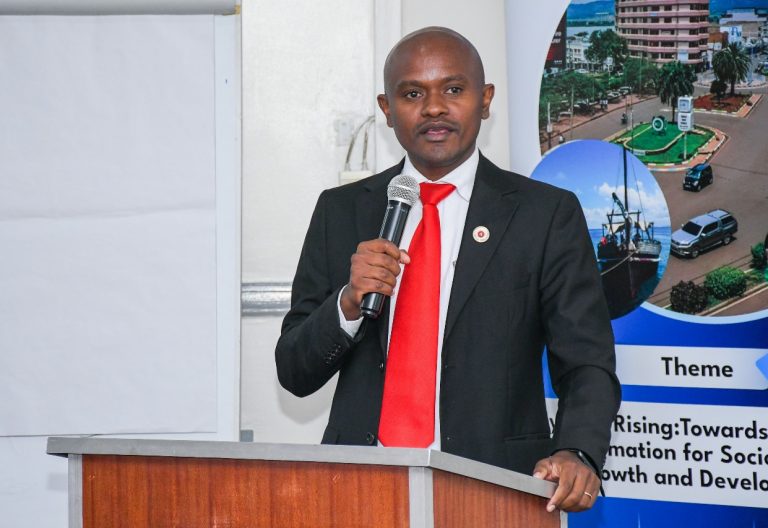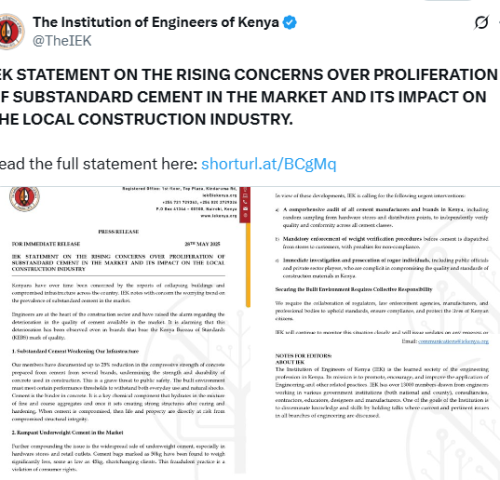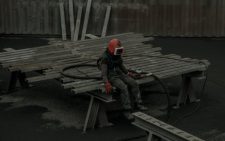IEK raises alarm over substandard cement threatening Kenya’s construction sector

The Institution of Engineers of Kenya (IEK) has issued a stark warning about the increasing presence of substandard cement in the Kenyan market, raising grave concerns over public safety and the integrity of the nation’s construction industry.
In an official statement released Wednesday, May 28, 2025, IEK noted that the deteriorating quality of cement has been linked to a growing number of collapsing buildings and compromised infrastructure across the country.
“Kenyans have over time been concerned by the reports of collapsing buildings and compromised infrastructure across the country,” the statement reads. “IEK notes with concern the worrying trend of the prevalence of substandard cement in the market.”
Engineers, who are central to Kenya’s construction industry, have been closely monitoring the situation and have reported a troubling pattern: a reduction of up to 25 percent in the compressive strength of concrete made from certain brands of cement.
“This is a grave threat to public safety,” Shammah Kiteme, president of IEK, said.
“Our members have documented up to a 25 percent reduction in the compressive strength of concrete prepared from cement from several brands, undermining the strength and durability of concrete used in construction.”
Alarmingly, the IEK notes that the problem is not limited to obscure or unregulated products. Some of the compromised cement has been found to bear the Kenya Bureau of Standards (KEBS) mark of quality, raising serious questions about regulatory oversight and enforcement.
“Cement is the binder in concrete. It is a key chemical component that hydrates in the mixture of fine and coarse aggregates. When cement is compromised, then life and property are directly at risk from compromised structural integrity,” the statement added.

Widespread fraud
In addition to quality concerns, the IEK has also highlighted rampant fraudulent practices in the sale of cement across retail outlets. Cement bags labeled as 50 kilograms are frequently underweight, some reportedly weighing as little as 45kg.
“This fraudulent practice is a violation of consumer rights,” the institution said. “We urge the relevant regulatory authorities to intensify market surveillance and spot checks across the country to stamp out this malpractice.”
The IEK is calling for immediate and coordinated action to address what it describes as a critical threat to Kenya’s built environment. The institution has laid out a three-point intervention plan:
Comprehensive audit of all cement manufacturers and brands in Kenya, including random sampling from retail stores to verify compliance with quality standards.
Mandatory weight verification of cement bags before dispatch, with strict penalties for violations.
Swift investigation and prosecution of individuals, both in public service and the private sector, found to be complicit in compromising construction standards.
“Securing the built environment requires collective responsibility,” Kiteme noted. “We require the collaboration of regulators, law enforcement agencies, manufacturers, and professional bodies to uphold standards, ensure compliance, and protect the lives of Kenyan citizens.”
IEK emphasized that it will continue to monitor developments closely and will provide updates on progress made or lack thereof on these urgent concerns. The institution also reaffirmed its commitment to working collaboratively with all stakeholders to ensure safety, professionalism, and integrity in Kenya’s construction industry.
“We remain ready to work with stakeholders to uphold integrity, safety, and professionalism in Kenya’s construction industry,” Kiteme asserted.















